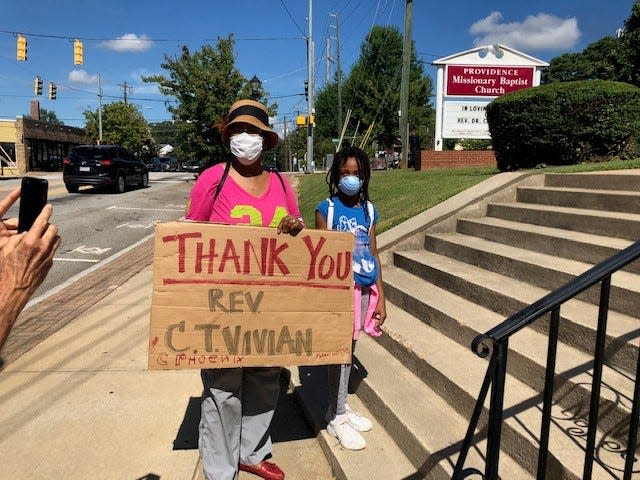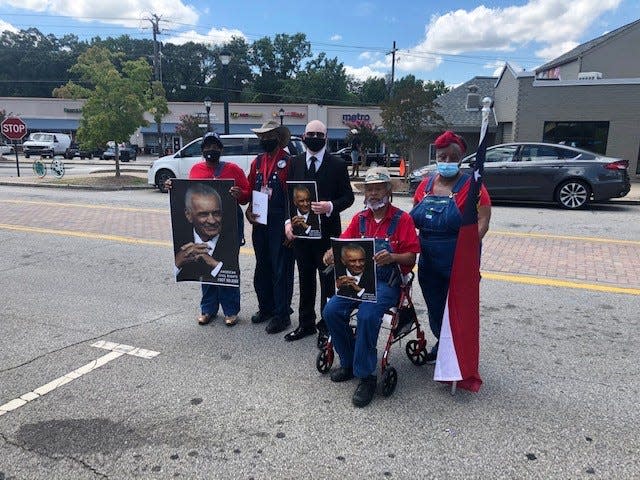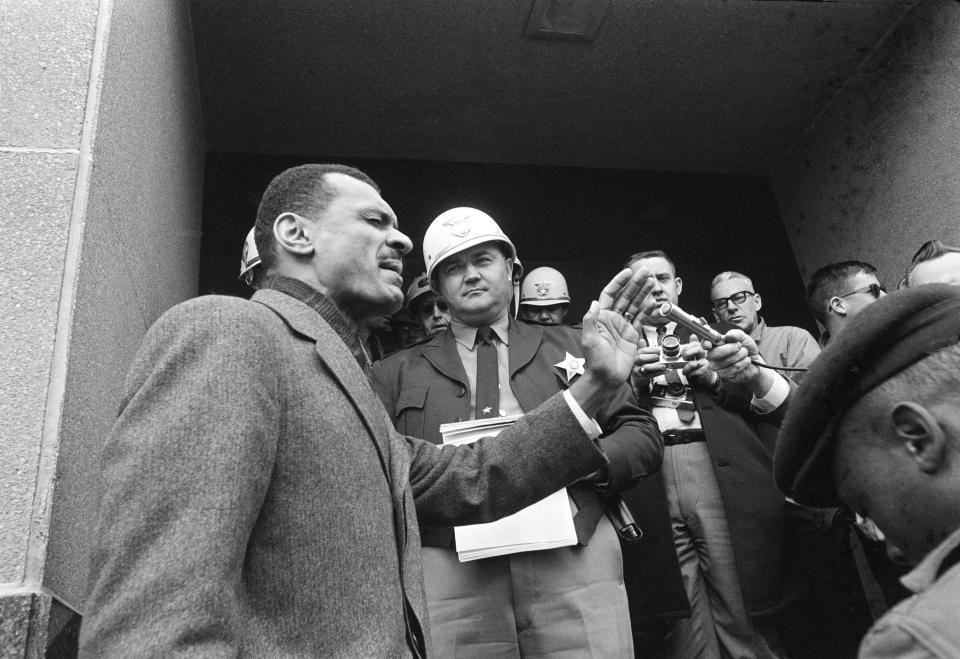Joe Biden, Martin Luther King III remember civil rights icon C.T. Vivian at private funeral in Atlanta
ATLANTA – The late civil rights leader C.T. Vivian was remembered Thursday morning at a private funeral in Providence Missionary Baptist Church.
The service started at 11 a.m. EDT and was closed to the public because of the coronavirus pandemic. Vivian died July 17 in his home of natural causes. He was 95.
Vivian's six grandsons served as pallbearers, and his friends and sons spoke at the service. Fifty family members and friends were allowed to attend.
Vivian was an active member of Providence Missionary Baptist. The church passed out masks and did temperature checks for those who attended. Mourners respected social distancing guidelines, leaving entire rows of pews empty or leaving ample space between them.

Outside the church, about a dozen supporters stood near the entrance, some holding signs and photos of Vivian. A police motorcade lined the street.
Edna Davis and her 9-year-old granddaughter carried a cardboard sign that read, “Thank you Rev. C.T. Vivian.”
Davis, a deaconess at the church, said she got to know Vivian when her daughter interviewed him for a Black History Month assignment at his house. Vivian talked about his struggles during the civil rights movement.
“We love Dr. C.T. Vivian, he was very warm and friendly and gracious,” said Davis, 65. “He did not meet a stranger, and he was very approachable.”
Davis said she was happy that Vivian’s contributions were recognized because he was a “quiet-spoken man” who was often overlooked.

Thomas Wall, 75, said he met Vivian years ago during his visits to Providence Missionary Baptist. He stood outside, wearing a shirt that read, “Vote or Die.”
Vivian’s death “hit us hard because icons are just passing,” Wall said, noting the passing of John Lewis and Charles Evers. “That’s the old guard, those are the ones who brought us through and paved the way. Now we gotta get ready for these younger people to step up and follow C.T. Vivian and John Lewis.”
More: C.T. Vivian remembered in Georgia state Capitol, taken to Martin Luther King Jr.'s tomb
C.T. Vivian: 5 things you may not have known about the giant figure in the civil rights movement
Video tributes by presidential candidate and former Vice President Joe Biden, Oprah Winfrey and baseball star Hank Aaron were broadcast on screens inside the church.
“A soldier who refused to raise his fists, a preacher whose voice helped electrify a movement, a leader who inspired generations to join him in the ceaseless march to progress,” Biden said in the tribute. “C.T. didn’t waste a single one of the days God granted him, and we all know that C.T.’s spirit is going to continue to inspire us to fulfill his mission, a mission that remains unfinished.”
Writer Claude McKay's poem "If We Must Die" was read during the funeral. It reads, in part, "If we must die, O let us nobly die, so that our precious blood may not be shed in vain."
The service ended at 1:18 p.m.
After the funeral, mourners gathered to watch pallbearers walk Vivian’s casket to the hearse as a bagpiper played "Amazing Grace." Some supporters kneeled in the street and saluted Vivian.
Martin Luther King III, the oldest son of Martin Luther King Jr., was among the invited attendees at the funeral. Atlanta Mayor Keisha Lance Bottoms was also in attendance.
King said Vivian lived his life in a “ferocious, positive way” and personified nonviolent protest.
"There was never an unkind word that he said, even when he stood up for injustice," King said after the service. Vivian could bring "the best out of scenario which could be the worst."
Wednesday, Vivian was honored in the Georgia State Capitol, where his body lay in state.
“This is an ultimate honor,” Vivian's son, Mark, said Wednesday after a short ceremony in the Capitol’s rotunda. “It’s just an honor that now more folks are learning who he is and what he stood for and also what the movement was and how the movement came about.”
Vivian's casket was taken in a processional to the Martin Luther King Jr. National Historic Park. King, whom Vivian closely advised, described Vivian as "the greatest preacher to ever live." In 2013, President Barack Obama honored Vivian, who had continued to promote racial equality, with the Presidential Medal of Freedom.

U.S. Rep. John Lewis, a fellow civil rights activist who marched with Vivian on March 7, 1965, what became known as Bloody Sunday, died the same day as Vivian.
Vivian's career spanned more than six decades, going back to his first sit-in demonstrations to desegregate a cafeteria in the 1940s in Peoria, Illinois. Vivian met King soon after the budding civil rights leader’s victory in the Montgomery bus boycott of 1955. He became an active member of what would become the Southern Christian Leadership Conference and participated in the Freedom Rides in Mississippi, when activists faced great violence while challenging segregation in public transit by riding buses across the South in 1961.
Perhaps best known for his work in Selma, Vivian argued with then-Sheriff James Clark on the steps of a courthouse in 1965 over racial inequities in voting during a drive to get Black citizens in the town registered. Clark struck Vivian, knocking him down. Vivian stood up and continued to make his arguments.
Weeks after the incident on the courthouse steps, thousands marched from Selma to Montgomery in Alabama on Bloody Sunday to bring awareness to racial inequities. The coverage of the violence against the marchers helped galvanize the country, and by the end of the year, Congress passed the Voting Rights Act of 1965.
Contributing: The Associated Press
This article originally appeared on USA TODAY: C.T. Vivian: civil rights hero to be remembered Thursday in funeral

